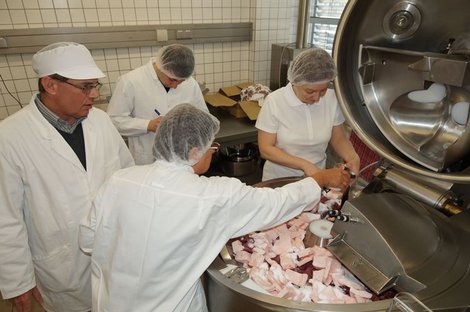Healthy sausage?

At the Anhalt University of Applied Sciences, a meat product has been developed that is seasoned with medicinal herbs, lower in fat and salt, and delicious
Healthy sausage? This sounds like a contradiction in terms, but it exists. This poultry sausage, with reduced salt and seasoned with medicinal plants, is already being sold in the branches of “Fleisch- und Wurstwarenproduktion Bernburg” (“Bernburg Meat and Sausage Production”), FLEPRO for short, under the name “Pro Gesundheit” (“For Health”). A sausage variety in four flavours, melissa-coriander-dill for example, or caraway-aniseed-fennel, with perhaps even healing, but at least preventive, effect upon gastrointestinal diseases. The recipe has been developed by the Foodstuff and Nutrition Research Working Group of the Anhalt University of Applied Sciences in Bernburg in the German state of Saxony-Anhalt.
The Department of Agriculture, Ecotrophology and Landscape Development of the University of Applied Sciences, which includes the research group around the Professor for Food Technology Wolfram Schnäckel, is dedicated to subjects to do with foodstuffs and their production. This includes consumer studies, process optimising of manufacturing, product development and marketing. One could also call the scientists “inventors”; after all, part of their work consists of creating new kinds of foods. The main focus here is upon meat, their main area of research.
When approaching the subject of “healthy sausage”, says Professor Wolfram Schnäckel, the first focus of attention was functional foodstuffs, which is to say a social trend towards foods with reduced fat and salt that has already existed for some time. “Colleagues considered how all the health-promoting effects could be combined and then added to.” Which eventually culminated in the question: can medicinal herbs be used instead of spices? And if so, which? “We have identified herbs that have a positive effect upon the gastrointestinal tract, have tested their aroma and flavour and narrowed them down.” Wolfram Schnäckel says that the spices used all have a medically proven positive influence on the digestive tract and are included in an acknowledged positive list of the Expert Committee for Herbal Medicinal Products of the European Medicines Agency and of the World Health Organisation. The used quantity of caraway, aniseed, fennel or ginger and other herbs is so high that the preventive effect is guaranteed with a consumption of 50 grams of sausage per day.
The meat product was developed in very small quantities in the laboratory. The reduction in fat was achieved by the use of poultry instead of pork, pig fat was replace by sunflower oil, which was added in technologically necessary quantities, and salt was reduced. “That was the biggest problem. The sausage still contains 1.3 percent cooking salt, although 1.8 percent is normal.” It was not possible to reduce this any further, says Wolfram Schnäckel, because salt ensures the cohesion of the individual ingredients and thus also the sausage’s firmness when cut.
After production in the laboratory, FLEPRO first took over pilot production and people were invited to take part in tasting. More than 300 men and women evaluated the creations, and the most popular proved to be the combination of caraway, coriander and cardamom. The scalded sausage was then produced by FLEPRO on a large scale, and has been available to buy since Easter last year. The sales figures are good. The Anhalt University of Applied Sciences already presented itself with its product at the Green Week 2016 in Berlin and the Saxony-Anhalt day in Köthen – with success.
The development process of a new product lasts one-and-a-half to two years, from the idea to the research in the laboratory to the possible filing of a patent. The question of financing is always a decisive matter. Three possibilities are open: firstly, there is industry, which awards research orders to the University and pays for them. Another is that students’ final assignments can be used to realise projects. “That does not last so long, but normally only small product optimisations can be achieved with this”, says Professor Schnäckel. The third existing possibility are regional, national or EU funding programmes.
It is in the framework of such a programme of the Federal Ministry of Agriculture that the working group around Professor Schnäckel has made another ground-breaking development, which could make possible the use of boar meat. “For almost 5,000 years, male piglets have been castrated, because their meat becomes inedible after sexual maturity. It stinks, you cannot eat it.” That is why, says Wolfram Schnäckel, farmers have traditionally castrated the animals, without the use of anaesthetic, when they are a week old. This process will be banned from 2019, however, and a global search is underway to find a solution to the problem. This could now come from Bernburg: together with the Research Institute for Organic Agriculture Trenthorst and the universities of Gießen and Göttingen, a way was found to mask the meat’s smell and flavour. By means of a smoking process and the addition of suitable spices, such as e.g. rosemary or oregano, ham, bacon and even mince was produced, the flavour of which did not differ from that of conventional products. Admittedly, the meat is not yet in the shops, because the law currently stipulates the destruction of odorous boar meat. “Political decisions are needed. Perhaps we have provided the preliminary research for them”, hopes Wolfram Schnäckel.
The Department of Agriculture, Ecotrophology, and Landscape Development has not just been successful in research, however, but also in process optimisation in industry. For example, innovative cutting tools have been developed for chopping masses of meat, which lead to substantial cost savings and are already established on the market.
At the International Green Week 2017 in Berlin, the Anhalt University of Applied Sciences will present itself with its distillery for teaching and testing.
image caption: from left, Prof. Dr. W. Schnäckel, Student Th. Vollmannshauser, Dipl. Ing., D. Schnäckel, Dr. J. Krickmeier
http://lebensmitteltechnologie.loel.hs-anhalt.de
Author & photo: Anja Falgowski
